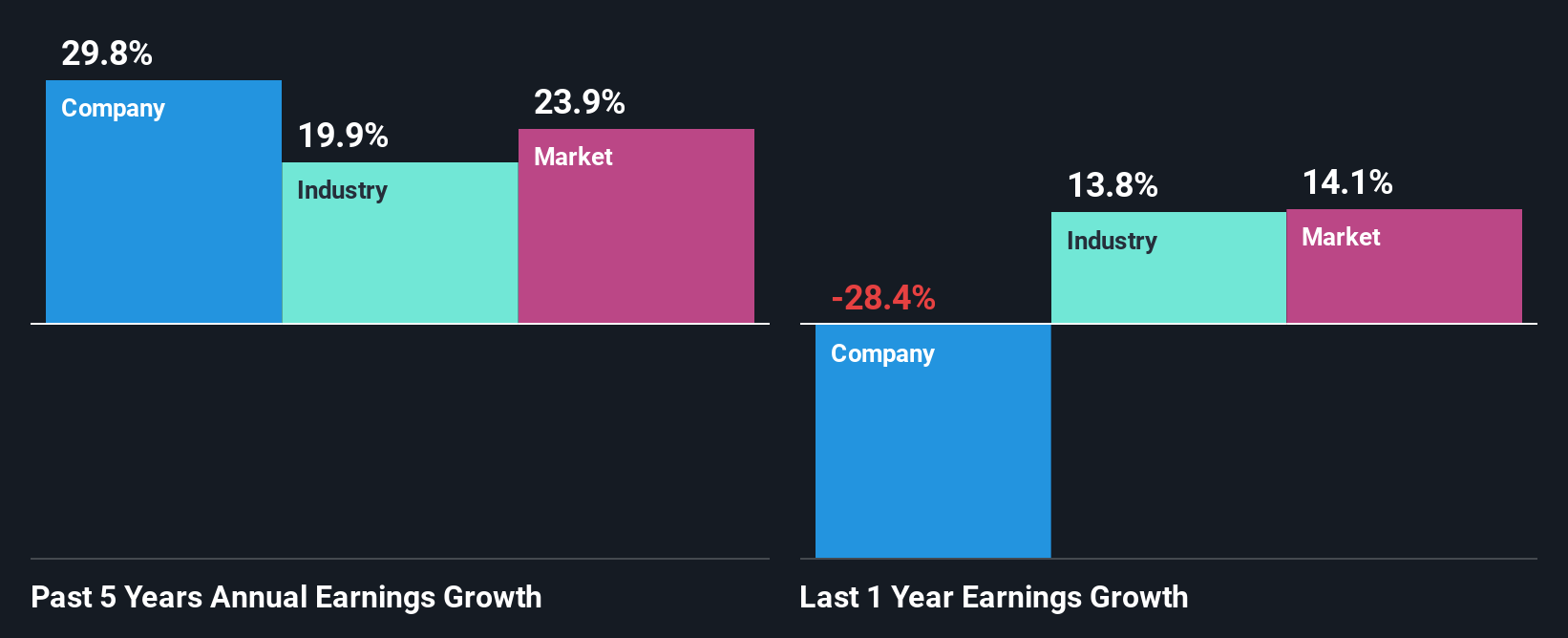Declining Stock and Solid Fundamentals: Is The Market Wrong About Bikaji Foods International Limited (NSE:BIKAJI)?
It is hard to get excited after looking at Bikaji Foods International's (NSE:BIKAJI) recent performance, when its stock has declined 3.0% over the past month. But if you pay close attention, you might gather that its strong financials could mean that the stock could potentially see an increase in value in the long-term, given how markets usually reward companies with good financial health. Specifically, we decided to study Bikaji Foods International's ROE in this article.
Return on equity or ROE is an important factor to be considered by a shareholder because it tells them how effectively their capital is being reinvested. Put another way, it reveals the company's success at turning shareholder investments into profits.
How Do You Calculate Return On Equity?
ROE can be calculated by using the formula:
Return on Equity = Net Profit (from continuing operations) ÷ Shareholders' Equity
So, based on the above formula, the ROE for Bikaji Foods International is:
13% = ₹2.0b ÷ ₹15b (Based on the trailing twelve months to June 2025).
The 'return' is the income the business earned over the last year. One way to conceptualize this is that for each ₹1 of shareholders' capital it has, the company made ₹0.13 in profit.
View our latest analysis for Bikaji Foods International
Why Is ROE Important For Earnings Growth?
Thus far, we have learned that ROE measures how efficiently a company is generating its profits. We now need to evaluate how much profit the company reinvests or "retains" for future growth which then gives us an idea about the growth potential of the company. Generally speaking, other things being equal, firms with a high return on equity and profit retention, have a higher growth rate than firms that don’t share these attributes.
Bikaji Foods International's Earnings Growth And 13% ROE
On the face of it, Bikaji Foods International's ROE is not much to talk about. However, the fact that the its ROE is quite higher to the industry average of 11% doesn't go unnoticed by us. Especially when you consider Bikaji Foods International's exceptional 30% net income growth over the past five years. That being said, the company does have a slightly low ROE to begin with, just that it is higher than the industry average. Therefore, the growth in earnings could also be the result of other factors. E.g the company has a low payout ratio or could belong to a high growth industry.
We then compared Bikaji Foods International's net income growth with the industry and we're pleased to see that the company's growth figure is higher when compared with the industry which has a growth rate of 20% in the same 5-year period.

Earnings growth is a huge factor in stock valuation. It’s important for an investor to know whether the market has priced in the company's expected earnings growth (or decline). This then helps them determine if the stock is placed for a bright or bleak future. Is Bikaji Foods International fairly valued compared to other companies? These 3 valuation measures might help you decide.
Is Bikaji Foods International Efficiently Re-investing Its Profits?
Bikaji Foods International has a really low three-year median payout ratio of 11%, meaning that it has the remaining 89% left over to reinvest into its business. So it looks like Bikaji Foods International is reinvesting profits heavily to grow its business, which shows in its earnings growth.
While Bikaji Foods International has seen growth in its earnings, it only recently started to pay a dividend. It is most likely that the company decided to impress new and existing shareholders with a dividend. Our latest analyst data shows that the future payout ratio of the company is expected to rise to 22% over the next three years. Still, forecasts suggest that Bikaji Foods International's future ROE will rise to 21% even though the the company's payout ratio is expected to rise. We presume that there could some other characteristics of the business that could be driving the anticipated growth in the company's ROE.
Summary
Overall, we are quite pleased with Bikaji Foods International's performance. Specifically, we like that it has been reinvesting a high portion of its profits at a moderate rate of return, resulting in earnings expansion. On studying current analyst estimates, we found that analysts expect the company to continue its recent growth streak. To know more about the latest analysts predictions for the company, check out this visualization of analyst forecasts for the company.
Valuation is complex, but we're here to simplify it.
Discover if Bikaji Foods International might be undervalued or overvalued with our detailed analysis, featuring fair value estimates, potential risks, dividends, insider trades, and its financial condition.
Access Free AnalysisHave feedback on this article? Concerned about the content? Get in touch with us directly. Alternatively, email editorial-team (at) simplywallst.com.
This article by Simply Wall St is general in nature. We provide commentary based on historical data and analyst forecasts only using an unbiased methodology and our articles are not intended to be financial advice. It does not constitute a recommendation to buy or sell any stock, and does not take account of your objectives, or your financial situation. We aim to bring you long-term focused analysis driven by fundamental data. Note that our analysis may not factor in the latest price-sensitive company announcements or qualitative material. Simply Wall St has no position in any stocks mentioned.
About NSEI:BIKAJI
Bikaji Foods International
Manufactures, purchases, and sells snack food products in India and internationally.
High growth potential with excellent balance sheet.
Similar Companies
Market Insights
Community Narratives


